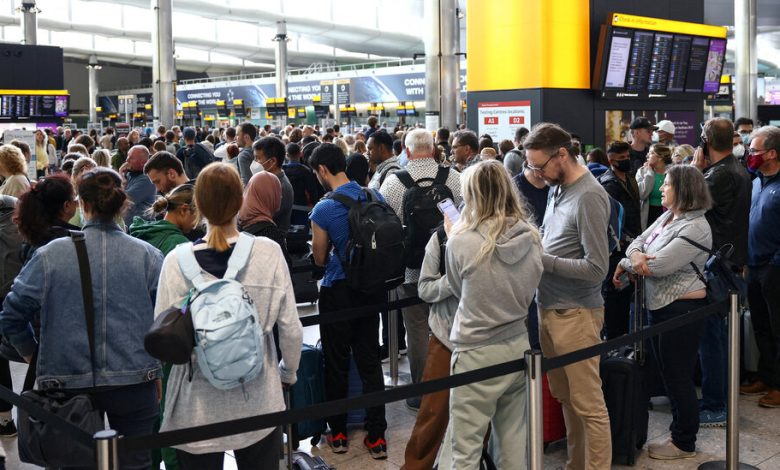Laptop? Liquids? U.K. Moves to Eliminate Some Airport Security Obstacles.

They are the rituals of modern travel: the frantic drinking of water bottles in airport security lines, the shampoos tossed into the trash, the fights over whether Bolognese sauce is a solid or a liquid.
And, as far as the British government is concerned, those days should come to an end by June 2024.
On Thursday, the British government said that new technology at its airports could let it substantially relax and speed up security checks, allowing liquid containers of up to two liters in hand luggage and doing away with a requirement to extract big electronics, like laptops or tablets, from carry-on bags.
Some airports around the world have already started introducing similar technology and scrapping the requirements, but experts said that Britain was ahead of the game in making a countrywide announcement.
“The U.K. are the pioneers,” said Jeffrey C. Price, a professor of aviation at the Metropolitan State University of Denver.
“We’re not aware of similar announcements/initiatives by other countries,” Perry Flint, a spokesman for the International Air Transport Association, a trade group for the world’s airlines, said in an email.
It is not the first time that Britain has made such an announcement. In 2019, the prime minister at the time, Boris Johnson, announced plans for all major British airports to introduce the screening equipment that would lead to the relaxing of the liquids rule by this month. The investment in new technology was delayed by the coronavirus pandemic.
Now, airports will have until June 2024 to upgrade their equipment and screening processes, the government said.
All airports in Britain will be required to adopt the latest technology in screening carry-on bags, said Laura Wilson, a spokeswoman for the Department for Transport, butthe technology could vary between airports and be put in place at different times. Mark Harper, the transport secretary, said he would ensure the use of the security technology at all “major” British airports by the June deadline.
On social media, some Britons expressed relief about being able to avoid the $5 bottles of water inside airport terminals. Others were unimpressed, arguing that they were not going to bring a half-liter of deodorant, anyway. One Twitter user promised “not to spill my pint.”
As is the case at many airports around the world, passengers are currently allowed to have liquid containers of up to only 100 milliliters, or 3.4 ounces, in their hand luggage, and only after putting them in a small, clear plastic bag before going through security checks.
The new screening equipment, which uses a type of X-ray technology, essentially provides a 3-D image of the contents of a passenger’s bag, and makes use of what the government said were “highly advanced threat detection algorithms.” It was already tested in some airports over the past four years, and the British government said it proved effective.
The government also said that the technology used in other countries may differ, so passengers should check with the airport that they are traveling from, or through, for advice.
The current rules on liquids were introduced in 2006 after the British authorities foiled a terrorist plot to conduct a series of attacks on planes between Britain and the United States.
The plan, the authorities said, was to use liquids in drinking bottles carried in hand luggage and to combine them into cocktails that would explode while the plane was over the Atlantic Ocean.
In the immediate aftermath of the plot’s foiling, passengers in Britain were allowed to bring only a few things onboard: passports, boarding passes, wallets and baby milk or formula — and airline staff asked parents to taste the milk or formula in front of them in order to allow it on planes. The ban on liquids remained in place until later that year, when small quantities were allowed. Similar restrictions on liquids were introduced around the world.
Mr. Price, the aviation professor, said that the United States — where some exceptions to the liquids rule exist for people traveling with infants or travelers with medical needs — was also integrating more advanced technology in airport checks, but that the process was slow because the technology was expensive to buy and to install.
“We are years away from announcing a change to the current liquids rule,” R. Carter Langston, a spokesman forthe Transportation Security Administration, said in an email.
Adalbert Jahnz, a spokesman for transport at the European Commission, said that several major airports in the European Union were moving in the same direction as Britain but that the bloc was not requiring airports to adopt more advanced technology to scan liquids. Last year, the Shannon Airport, in western Ireland, introduced a security screening system that allowed it to eliminate the requirement for liquids.





